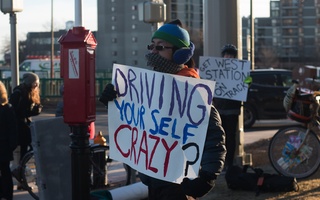New York City is no country for driving men (or women). A combination of congested streets, alternate-side parking regulations, and excellent public transportation make it one of the few places in the world where a car is usually more of a hindrance than an asset when trying to get from one place to another.
So naturally, the city is attempting to take the next step towards disincentivizing driving by imposing a fee on motorists who enter lower Manhattan on weekdays. The planned congestion tax, a brainchild of New York City Mayor Michael R. Bloomberg, has been proceeding slowly through the Albany mire that is the New York State Legislature—now, as a result of a recent political deal, its chances of approval are looking good.
Not everyone is celebrating. Polls have shown that a majority of voters disapprove of the new measure, and the congestion tax still has numerous opponents in Albany, some of which seem more concerned about the mayor’s brash negotiating style than the actual substance of his proposal. (Bloomberg attempted to steamroll the plan through the legislature, and responded angrily when he met resistance.) But while Bloomberg’s fervor has made him few friends, his adamance is understandable given the many benefits a congestion tax has to offer.
Congestion is a major problem for urban areas worldwide and New York is no exception. Traffic jams cost the city an estimated $13 billion every year in wasted time and fuel, in addition to being a major source of pollution. The proposed congestion tax promises to reduce the number of cars on the road while increasing the average speed of vehicles that remain. Meanwhile, the funds collected from the tax will be used to bolster public transportation, offering more eco- and traffic-friendly alternatives. While critics charge that the tax is regressive, since the proposed eight dollar fee will present more of a burden to poor motorists, they fail to note that a majority of automotive commuters earn above-average incomes, and that the tax means increased funding for buses and subways that are used disproportionately by less affluent residents.
Many other cities around the world, such as Singapore, Stockholm, and London have successfully turned to congestion pricing in order to combat their traffic woes. London Mayor Ken Livingstone initially faced heavy resistance when he introduced a congestion tax to his city, but Londoners changed their tune after the program simultaneously reduced traffic delays by 30 percent and provided $360 million in public transportation improvements. There is no reason to believe that New Yorkers won’t warm to Bloomberg’s plan as well once they see the positive results.
The congestion tax presents a viable solution to the problems of urban areas because it is built on sound economic principles. A congested road is a common resource; due to the self-interest of drivers it gets overused and society suffers the consequences. By instituting a tax, the government is effectively transforming crowded city streets into private goods. Those who need the roads the most can do so uninhibited by traffic by paying for the privilege. Additionally, cars (especially cars that idle frequently while attempting to negotiate rush-hour gridlock) confer negative externalities due to the pollution they emit. By giving commuters more reason to use alternative methods of transportation, a congestion tax helps bring driving down to a more socially optimal level.
No one likes paying for something that was once free. The fight over the transformation of the open road into the taxed road epitomizes the conflict between the cool rationality of economic logic and the messier domains of human intuition and emotion. In this case, we should go with our heads, not our guts, and learn to love the congestion tax.
After all, the more driving costs, the less embarrassed I’ll be that I don’t even have a learner’s permit.
Daniel E. Herz-Roiphe ’10 is a Crimson editorial editor in Adams House.
Read more in Opinion
More to Life Than HarvardRecommended Articles
-
Cambridge Fights to Unsnarl TrafficHarvard Square, Cambridge's nationally notorious traffic intersection, is in a whirl this month. The City Planning Board, in another desperate
-
Medication for an SUV NationAmericans have resigned themselves to an inexorable fate. With a sigh and a shrug, they pull the gas pump off
-
Car CrunchMost Harvard students nowadays only think about parking in Harvard Square when their parents come to visit. Questions of traffic
-
 Allstonians Rally to Protest Against West Station Delay
Allstonians Rally to Protest Against West Station Delay -
 Allstonians Brainstorm Solutions to Traffic Congestion
Allstonians Brainstorm Solutions to Traffic Congestion













